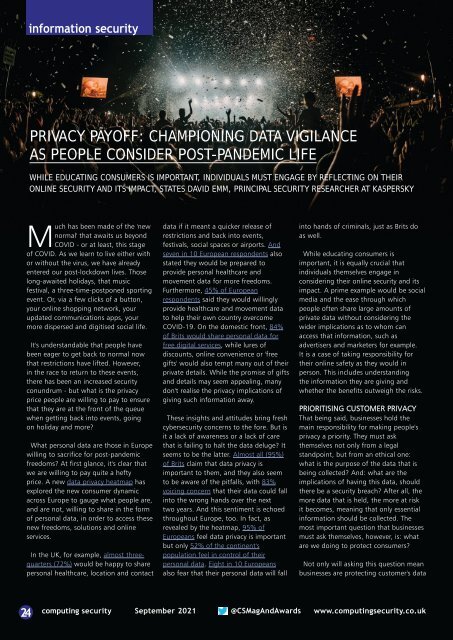CS Sep-Oct 2021
Create successful ePaper yourself
Turn your PDF publications into a flip-book with our unique Google optimized e-Paper software.
information security<br />
PRIVACY PAYOFF: CHAMPIONING DATA VIGILANCE<br />
AS PEOPLE CONSIDER POST-PANDEMIC LIFE<br />
WHILE EDUCATING CONSUMERS IS IMPORTANT, INDIVIDUALS MUST ENGAGE BY REFLECTING ON THEIR<br />
ONLINE SECURITY AND ITS IMPACT, STATES DAVID EMM, PRINCIPAL SECURITY RESEARCHER AT KASPERSKY<br />
Much has been made of the 'new<br />
normal' that awaits us beyond<br />
COVID - or at least, this stage<br />
of COVID. As we learn to live either with<br />
or without the virus, we have already<br />
entered our post-lockdown lives. Those<br />
long-awaited holidays, that music<br />
festival, a three-time-postponed sporting<br />
event. Or, via a few clicks of a button,<br />
your online shopping network, your<br />
updated communications apps, your<br />
more dispersed and digitised social life.<br />
It's understandable that people have<br />
been eager to get back to normal now<br />
that restrictions have lifted. However,<br />
in the race to return to these events,<br />
there has been an increased security<br />
conundrum - but what is the privacy<br />
price people are willing to pay to ensure<br />
that they are at the front of the queue<br />
when getting back into events, going<br />
on holiday and more?<br />
What personal data are those in Europe<br />
willing to sacrifice for post-pandemic<br />
freedoms? At first glance, it's clear that<br />
we are willing to pay quite a hefty<br />
price. A new data privacy heatmap has<br />
explored the new consumer dynamic<br />
across Europe to gauge what people are,<br />
and are not, willing to share in the form<br />
of personal data, in order to access these<br />
new freedoms, solutions and online<br />
services.<br />
In the UK, for example, almost threequarters<br />
(72%) would be happy to share<br />
personal healthcare, location and contact<br />
data if it meant a quicker release of<br />
restrictions and back into events,<br />
festivals, social spaces or airports. And<br />
seven in 10 European respondents also<br />
stated they would be prepared to<br />
provide personal healthcare and<br />
movement data for more freedoms.<br />
Furthermore, 45% of European<br />
respondents said they would willingly<br />
provide healthcare and movement data<br />
to help their own country overcome<br />
COVID-19. On the domestic front, 84%<br />
of Brits would share personal data for<br />
free digital services, while lures of<br />
discounts, online convenience or 'free<br />
gifts' would also tempt many out of their<br />
private details. While the promise of gifts<br />
and details may seem appealing, many<br />
don't realise the privacy implications of<br />
giving such information away.<br />
These insights and attitudes bring fresh<br />
cybersecurity concerns to the fore. But is<br />
it a lack of awareness or a lack of care<br />
that is failing to halt the data deluge? It<br />
seems to be the latter. Almost all (95%)<br />
of Brits claim that data privacy is<br />
important to them, and they also seem<br />
to be aware of the pitfalls, with 83%<br />
voicing concern that their data could fall<br />
into the wrong hands over the next<br />
two years. And this sentiment is echoed<br />
throughout Europe, too. In fact, as<br />
revealed by the heatmap, 95% of<br />
Europeans feel data privacy is important<br />
but only 52% of the continent's<br />
population feel in control of their<br />
personal data. Eight in 10 Europeans<br />
also fear that their personal data will fall<br />
into hands of criminals, just as Brits do<br />
as well.<br />
While educating consumers is<br />
important, it is equally crucial that<br />
individuals themselves engage in<br />
considering their online security and its<br />
impact. A prime example would be social<br />
media and the ease through which<br />
people often share large amounts of<br />
private data without considering the<br />
wider implications as to whom can<br />
access that information, such as<br />
advertisers and marketers for example.<br />
It is a case of taking responsibility for<br />
their online safety as they would in<br />
person. This includes understanding<br />
the information they are giving and<br />
whether the benefits outweigh the risks.<br />
PRIORITISING CUSTOMER PRIVACY<br />
That being said, businesses hold the<br />
main responsibility for making people's<br />
privacy a priority. They must ask<br />
themselves not only from a legal<br />
standpoint, but from an ethical one:<br />
what is the purpose of the data that is<br />
being collected? And: what are the<br />
implications of having this data, should<br />
there be a security breach? After all, the<br />
more data that is held, the more at risk<br />
it becomes, meaning that only essential<br />
information should be collected. The<br />
most important question that businesses<br />
must ask themselves, however, is: what<br />
are we doing to protect consumers?<br />
Not only will asking this question mean<br />
businesses are protecting customer's data<br />
24<br />
computing security <strong>Sep</strong>tember <strong>2021</strong> @<strong>CS</strong>MagAndAwards www.computingsecurity.co.uk

















